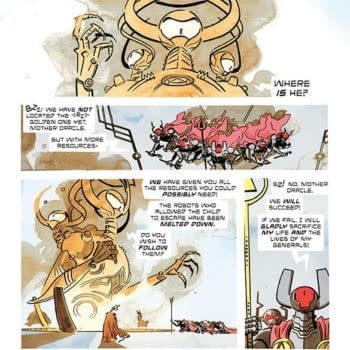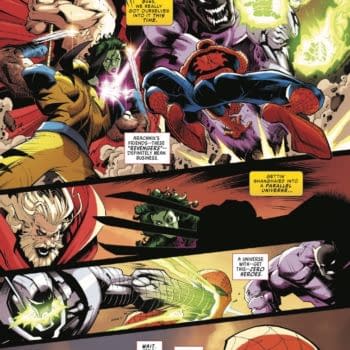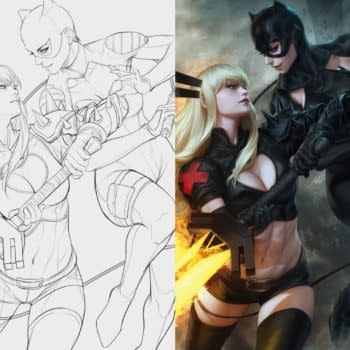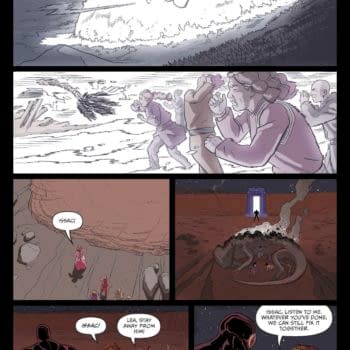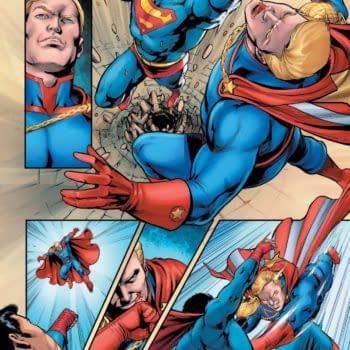Posted in: Comics, Recent Updates | Tagged: alien, avatar press, Caliban, Comics, entertainment, Facundo Percio, garth ennis, horror, science fiction
'There's No Road Map, No Rule Book' In Caliban – The Bleeding Cool Interview With Garth Ennis
On April 30th, new sci-fi horror comic Caliban from Avatar Press arrives in shops, written by the great Garth Ennis (Preacher, 303, Crossed), with art by Facundo Percio (Anna Mercury, Fashion Beast), and for both creators, it's a chance to spread their wings by using many of the elements they're best known for in combinations never seen by readers before.
Caliban explores the experiences of the crew of a mining vessel venturing into deep space, making alien contact for the very first time on behalf of humanity, and learning along with the reader that the unknown can be far, far darker than they could possibly imagine. The intricacies of the crew's personal lives, their hopes and aspirations, and their flaws all come into play to determine how they handle totally alien situations and environments, and as such it's a book based on tension, wonder, and questioning exactly what makes human beings tick.
Garth Ennis speaks here with Bleeding Cool about the long genesis of the series in his mind, the strengths of the horror and sci-fi genres, and what he thinks the narrative says about human nature.
Hannah Means-Shannon: What was the appeal for you of bringing science fiction and horror elements together in a story? Do you have any examples of books or films that you think have successfully blended those elements?
Garth Ennis: I started thinking about Caliban some years ago, when I heard there was going to be a prequel to Alien– which is one of my all-time favorite films and in fact still haunts my nightmares to this day. I occasionally find myself idly running through various aspects of it, either with a couple of like-minded friends in the pub or just in my own head. When I eventually saw Prometheus I realized straightaway they were going in a wildly different direction from what I'd expected, but by that point my mind had cast up so many ideas that I had an entirely different story of my own. And I thought- yeah, why not?
Alien would fulfill your criteria perfectly, I think. To my mind it's a beautiful film, very nearly flawless. Easily tops my lists not just for sci-fi and horror but also suspense in general. Obviously it casts a very long shadow; you can't watch or read any story where things go bump in the night in space and not see its influence to one extent or another. So for me the question is whether or not you can add anything of your own: I've seen so many things over the years where Alien's been lurking somewhere in the background, Pitch Black, Event Horizon, Pandorum, to name but a few, and sometimes they've got something new to say and other times they don't. With Caliban, I like to think I do.
HMS: I notice that Caliban opens by making reference to the early days of European exploration when companies were quite callous about the fate of their commerce-driven explorers. It reminded me of a story from the Elizabethan era when a crew, having lost most of their people, were thrown into prison upon their return for not bringing back enough of value. Was this early era a big influence on your thinking when writing Caliban? Or are you looking at more modern corporate behavior?
GE: There is a certain parallel with the age of exploration, especially regarding setting out into the complete unknown, but Caliban is much more a reflection of the modern corporate environment- where people are told they're part of a family and then flung to the wolves whenever necessary. Clearly it doesn't take long for this to engender a certain cynicism, and with the reality of corporate indifference staring you in the face on a starship billions of miles from home, that's going to be magnified several times over. This is one area where I thought Alien did a particularly nice job, actually; where you have desperate, terrified people asking "what about our lives?" and a grotesque severed head on the floor smiles a patronizing administrator's smile, slobbers dubious fluid everywhere, and explains that all such considerations are rescinded.
HMS: Though there is an evolving cast of characters in Caliban, the two who seem to feature most prominently are young, rather gutsy women. Any particular reason for this choice? What do you think their personalities bring to the storytelling?
GE: On the one hand you have an aspect that's quite specific to the storyline, and I can't go into detail without blowing the ending. On the other hand you're once again seeing the influence of Alien (and I'll try to make this the last mention), wherein both the most and least capable members of the crew were women. That said, where Ripley is a competent and resourceful survivor type and Lambert a gibbering wreck (one of the best and most realistic portrayals of genuine terror I've ever seen, kudos to Veronica Cartwright), the characters in Caliban perhaps provide a slightly less stark contrast: Sanchita is tough and clever but quite uncomfortable in the role of leader, whereas Nomi is certainly no fighter but highly intelligent and imaginative, very good at figuring things out.
HMS: The references to Earth in Caliban seem to portray quite a dark picture of humanity's future driven by economic overgrowth and obsession with production. Do you think that this is a pattern that can't be avoided, something that even our explorers in the comic are likely to carry to new worlds if they succeed in reaching them?
GE: I remember back in the mid-80's when climate change or the greenhouse effect were first mentioned, and seeing people's reactions when they were told the changes they'd have to make in their lifestyles to head off the problem. Even then I recall thinking that this wasn't going to fly, that human beings would generally rather adapt to changing conditions instead of taking drastic action to avoid them happening at all. So carry on living the way you are, and if the water levels rise someone will manufacture and market a cheap, portable rubber dinghy you can carry around in a bag. Ultraviolet rays? A hat that expands into a tent. And so on.
Today we're seeing the notion of climate change as something that can actually be denied, and as with so much other modern bullshit the lunatics have somehow worked their way into what should be a rational conversation, demanding to be taken seriously. Same thing: do not act, instead simply adapt. My faith in human nature tells me this is the kind of attitude we'll definitely be taking with us to the stars. New world with vast oil and coal resources? Well, before we start tearing the place up to get at it, let's think about how we can avoid any long-term environmental impact and… oh, you've already started. Right.
HMS: The crew of the Caliban face an almost inexplicable and unpredictable threat in the comic and seem almost childlike in their inability to understand and cope. Do you think that human beings generally are overconfident in their ability to handle the unknown?
GE: So much of it involves taking a chance and seeing what happens; that's the very nature of the unknown. There's no road map, no rule book. The crew of the Caliban are far from home with a 100% lethal environment on the other side of the wall- they live with that on a daily basis, and when you add a hostile organism and a malfunctioning ship you leave them with very little room to maneuver. The failure of the Caliban itself- not just their home but really the only resource they have in the battle for survival- is quite critical here.
Long before the monster shows up, you have to deal with the reality of being trapped in a claustrophobic tin can, far from home, beyond all help, with a bunch of people just as resentful and dysfunctional as you are. You probably go mental. The airlock starts to look good. Out you go.
HMS: Nomi seems like a character who is both quite world-weary and pragmatic, commenting on the unrealistic expectations of her family regarding space travel, but also the only character, perhaps, who still preserves a sense of wonder about exploration. Is this book about confronting the real dangers of following curiosity and avarice, or do you think there's still room for wonder in the universe?
GE: That very conflict is central to Nomi's role in the book. Going back to the idea of the age of exploration, is there a fabulous new world of wonder and opportunity waiting out there, or is curiosity going to kill the cat in the most ghastly way imaginable? Answer is- probably a bit of both.
HMS: I notice that a lot of tension in the book is about the gradual reveal of information which kind of follows the characters own discoveries. What are your strategies for creating suspense in comic writing?
GE: That's one of those things I do instinctively but find hard to explain, in a "those that can, do" sort of way. It probably comes down to a series of tricks.
HMS: The personal relationships between crew members take on major significance in how they react to threats and trauma. What do you think science fiction and horror elements can do to help us examine human psychology and emotions?
GE: Really just a question of tension, which isn't the sole province of either genre. As in any thriller, which way do you jump when the shit hits the fan?
Avatar Press is the owner of Bleeding Cool; Hannah Means-Shannon is EIC at Bleeding Cool and @hannahmenzies on Twitter















